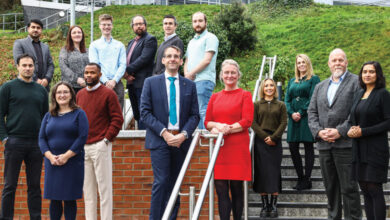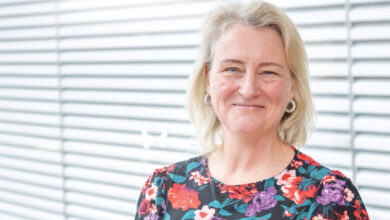Bill McCluggage: a brave new world
 Bill McCluggage told an agendaNi seminar that cloud computing “should be celebrated” and outlined progress on the creation of a government cloud.
Bill McCluggage told an agendaNi seminar that cloud computing “should be celebrated” and outlined progress on the creation of a government cloud.
“I believe that we are in a new paradigm and are moving into a completely new way of working,” Bill McCluggage told the cloud computing seminar in December.
McCluggage is the Deputy Government CIO in the Cabinet Office and was previously Director of the Department of Finance and Personnel’s Delivery and Innovation Division. He is at the forefront of the UK Government’s drive to create a government cloud (G-cloud). Essentially, what the Government wants is “IT as a service where we have no up-front capex investment.”
There are currently 200,000 servers across the public sector and at least 10,000 distinct applications being used by various departments (e.g. payroll and human resources). In addition: “We have [approximately] 600,000 users sitting in central government with no real aggregation of application or data mobility between departments,” McCluggage explained. There are some “legal
gateways” such as when data has to be moved between HMRC and the Department of Work and Pensions but this needs to be more flexible.
Whitehall wants the relevant applications to be accessible from a government apps store hosted on the G-cloud. As a consequence, central government’s 200 data centres could be consolidated and its £6 billion annual ICT spend reduced. “The potential for G-cloud to release 30 per cent of our annual costs is sitting there on our doorstep,” he contends.
There are 90,000 servers in the UK’s public sector and they are only running at 10 per cent utilisation.
“Who goes home tonight, turns on a three-bar heater in every room in the house and then goes and sits in one room? That’s what we are doing with the under-utilisation of our assets in central government,” McCluggage stated. “We are not at the situation where [ICT assets] are highly virtualised, where they are delivering real power for the money we are putting into them.”
McCluggage explained the three clouds: public, private and hybrid, and outlined the pros and cons of each.
The public cloud is services and infrastructure provided over the internet. It is “off-site”, comes with security and data protection [issues] but [also] comes with an amazing price reduction activity for shared infrastructure,” he said.
The private cloud has “much more improved security layers, with data protection, but are at a slightly higher price,” he surmises.
Currently, “a series of private cloud activities are forming in various government departments as the industry suppliers are exploiting new technology to reduce cost base and give themselves flexibility and agility.”
The hybrid cloud “has more complex rule settings.” It is “a variety of public and private options [where] each aspect of the business uses the most efficient environment.” McCluggage continued: “It comes with a complexity of governance and complexity of compliance and certain risks in terms of where you are actually putting those assets.”
McCluggage revealed the Government’s vision for a G-cloud. “We cannot afford capex [so] we are looking at a pay as you go model. There’s no long-term lock in, no volume lock in, there’s an elastic capability of the infrastructure, a friction-free data transfer and [it is] procurement friendly.”
He used ‘Boris’ bikes’ – London’s first large-scale public bike hire scheme – as an analogy for how the G-cloud should work. The bikes are “pay-as-you-go instruments”. They are “no-term lock-in.” He continued: “I can take one and cycle it across London and pay for what I need. There’s no volume lock in. At night-time you see them come and move the bikes around the city in trailers. They are redistributing the assets.”
He added: “They are elastic. When tourists arrive, there are bikes [available] and they just surge. They are friction-free in terms of drop-off and capture and they are very procurement-friendly.”
The Cabinet Office is considering impact level 3 and lower (whereby cloud and other business processes become aligned, enabling a more integrated management activity). This means that it is “not high end” in terms of security.
It is initially looking at the public cloud. “I’m not saying that’s our policy by any means, but we should be looking at where we can exploit public cloud in our best interests to start with,” McCluggage explained.
An example is Ordinance Survey in Great Britain which is “an open space that is hosted on a cloud platform which costs a third less than what they were previously paying and has 18 times more surge capacity on that contract.”
The Cabinet Office is concurrently working with the private sector through an initiative called G-digital. It aims to “take advantage of new and emerging service and commercial models to deliver benefits to the government.”
McCluggage refers to G-digital as: “the next generation thought process where we are interacting with industry.”
He continued: “There is an ecosystem of private clouds growing as we speak. In the next few months we will see private clouds that can communicate within a layer. [You can have] variants of clouds within environments and eco-systems that are specifically business friendly.”
In building the G-cloud, the Government has a target of reducing central government data centres “significantly” by 2020, and by 80 per cent across the wider public sector.
It is also considering the introduction of foundation delivery partners. These are public sector bodies who have volunteered to build the G-cloud services. McCluggage explained that the services being considered are: web hosting and content management, infrastructure as a service, public cloud services, collaboration tools and secure e-mail.
In conclusion, McCluggage said that the final G-cloud will offer five activities:
• a testing world where “you can do a lot of app testing in a completely neutral public cloud environment as long as you don’t match it with the a sensitive data environment”;
• a shared world: This is currently evident with Directgov, Datagov and BusinessLink sharing the ERP human resources programme;
• a web world: where online services are available to employees, citizens and business;
• an SME world: where the G-Cloud will offer its services to non-government customers such as UK tax growth and innovation; and
• a hosting world: where data centres would be shared and economies of scale and capex would be reduced.





